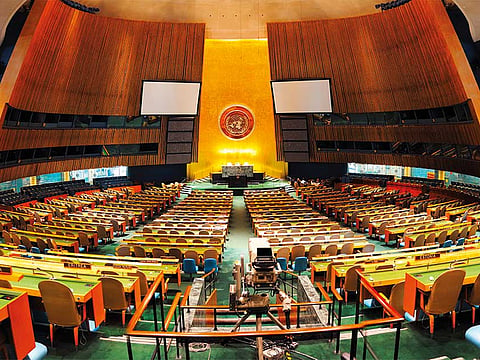Sticking points at 73rd UN General Assembly
Focus on Iran and North Korea at global gathering

WASHINGTON: President Donald Trump made quite a splash at the annual United Nations gathering of world leaders last year.
Addressing the UN General Assembly, he blasted North Korean dictator Kim Jong Un as “Rocket Man,” threatened to “totally destroy” North Korea and warned of global peril from “loser terrorists” and the “wicked few.”
It was standing room only for presidents, prime ministers and diplomats curious about America’s most undiplomatic president.
When Trump returns to the UN on Tuesday, he is expected to claim that his brash diplomacy has eased tensions with North Korea and that Daesh is on the run. He also will discuss the opioid crisis, the danger of nuclear proliferation and his “foreign policy success,” according to Nikki Haley, the US ambassador to the UN.
She said Trump also will make it clear that he does not see international alliances and organisations — including UN agencies — as other presidents have.
“He’ll also lay down a marker that while the United States is generous, we’re going to be generous to those who share our values, generous to those who want to work with us, and not those that try and stop the United States or say they hate America, or are counterproductive to what we’re doing,” Haley said.
Here is what lies ahead on the agenda this week as the 73rd UN General Assembly gets under way on Monday:
IRAN
Iran may bear the brunt of Trump’s harshest rhetoric this year for what the administration considers its malign behaviour, including support for militants in Yemen, Lebanon, Iraq and elsewhere.
According to a senior US official, Trump plans to repeat his claim that the Iran nuclear deal failed, and is likely to scold Europeans for continuing to try to salvage the international agreement that Trump withdrew from in May.
The increasingly strident US rhetoric against Iran is expected to be a feature in US speeches. Haley said that “every dangerous spot in the world — Iran seems to have its fingerprints in it,” which Tehran denies.
Trump pulled the US out of the 2015 Iran nuclear agreement in May and the foreign ministers of the five remaining powers who support the deal — Russia, China, Britain, France and Germany — are expected to meet privately Monday evening with Iranian Foreign Minister Mohammad Javad Zarif.
Iranian President Hassan Rouhani will address the fallout from the US decision to abandon the nuclear deal when he takes the podium shortly after Trump on Tuesday.
European countries along with Russia and China are still working to salvage the accord and will use the council meeting chaired by Trump to defend what they consider as a milestone in non-proliferation.
MIDDLE EAST
The seven-year-old conflict in Syria and the three-year war in Yemen that has sparked a humanitarian crisis will certainly be in the spotlight, along with meetings on other Mideast and African hot spots. But struggling with tighter budgets from US cuts, the United Nations has been put on the defensive as its peace efforts in Syria, Libya and Yemen fall short.
NORTH KOREA
The diplomatic gathering will take stock of the thaw in relations between North and South Korea, and ground-breaking US-North Korea moves to address the threat from Pyongyang’s nuclear and ballistic missile programmes.
Last year, world leaders shuddered as Trump threatened to totally destroy North Korea and belittled Kim as “Rocket Man on a suicide mission.”
An exchange of insults ensued, with Kim calling out the “mentally deranged US dotard.” While at the UN, Trump is expected to meet with South Korean President Moon Jae-in to receive a private message from Kim. Kim and Trump have said they hope to meet again this year, and the White House has said it is working to arrange another summit.
US Secretary of State Mike Pompeo will preside over the second meeting Thursday on North Korea, an issue the Security Council was united on in imposing increasingly tough sanctions.
But that unity now appears to be at risk over enforcement of sanctions and the broader issues of how to achieve denuclearisation of the Korean peninsula and when sanctions should be lifted against North Korea.
DRUG PROBLEM
Trump is hosting an event Monday on “The World Drug Problem” and Haley said 124 countries have signed a global call to action. Activists on drug policy note it was never negotiated, and one group, the Harm Reduction Coalition, called it “an instance of heavy-handed US ‘with us or against us’ diplomacy.”
OTHER ISSUES
UN spokesman Stephane Dujarric said the UN has received 342 requests for meetings during the high-level week.
They includes sessions on conflicts in Syria, Libya, Yemen, Mali and Central African Republic as well as the plight of Rohingya Muslims in Myanmar, aid for Palestinians, education for girls, modern slavery, environmental threats, efforts to end poverty, and the 70th anniversary of the Universal Declaration on Human Rights.
Asked what are the big issues, Russia’s UN ambassador, Vassily Nebenzia, said: “All of them are big issues — non-proliferation, cooperation, the world peace architecture — it’s every year, but this year it’s maybe more topical than ever.”
Sign up for the Daily Briefing
Get the latest news and updates straight to your inbox



